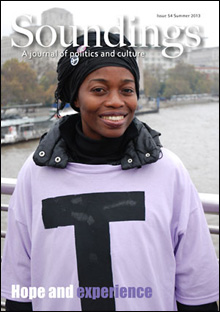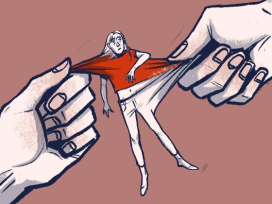Soundings does not have a written policy on gender but as an organization, we have a strong commitment to gender equality. Lawrence & Wishart, the publisher and a company limited by guarantee, has a board of five, of whom three are women, including myself as managing director (female). The editorial board of Soundings consists of five men and three women.
Lawrence & Wishart is a socialist publisher and all our paid permanent staff, of which there are only four, are women. All four Lawrence & Wishart paid staff work on the journal in some capacity, whether with regard to editorial, promotion, subscriptions or the website.
Of the co-editors, I am employed by Lawrence & Wishart, although I also put in voluntary time on the journal. My co-editor, Ben Little, a man, is an academic, so he contributes voluntarily but his work on Soundings does link in with his job in some ways. The person responsible for typesetting and layout is freelance and male. We also have one regular editorial and promotional volunteer on the journal (a woman), a voluntary poetry editor (also a woman), and a voluntary reviews editor (a man). In total, nine people work on the journal, of whom six are women.
We don’t employ secretaries – that is both a feminist and an anti-hierarchical stance. We all do our own administrative tasks.
At Soundings, wages are determined by experience, skills and time in the organization. Of course, in many organizations the division of labour itself is gendered and that is why women get paid less, but that is not the case here. All board members of Lawrence & Wishart and Soundings are committed to gender equality and share the desire to improve numbers of women contributors. I have had a strong input into Soundings since it began and we have always been committed to gender equality, so that has not changed much.
Gender and cultural journals
Eurozine partner journals are not unique in being dominated by male editors and contributors. But what’s the bigger picture regarding gender and cultural journals? Do journals have the resources to deal with it? And what role does gender play, if any, where commissioning patterns and content are concerned?
Eurozine asked selected partner journals to respond to a European survey on gender and cultural journals that examines these issues in greater depth.
Dialogi, Slovenia
Soundings, UK
Syn og Segn, Norway
Esprit, France
Merkur, Germany
Gernero, Serbia
ResPublica Nova, Poland
Spilne, Ukraine
L’Homme, Austria
Indeed, as publishing is itself a sort of service industry, women are well represented within it. There is, however, a gendered division of labour between those who work in publishing (mainly women) and those who are authors (mainly men).
 We have always taken gender into consideration in commissioning, but it has always been difficult. We certainly do believe it is worthwhile spending extra time on this, and in fact we do so, but in some areas it is very difficult: in economics for example. So, although we are aware of this issue and try to overcome it we are not able to achieve equality of gender distribution as regards authors. Our primary problem is that our main focus is politics and this is traditionally a male area (we also have a cultural agenda but the main content focuses politics).
We have always taken gender into consideration in commissioning, but it has always been difficult. We certainly do believe it is worthwhile spending extra time on this, and in fact we do so, but in some areas it is very difficult: in economics for example. So, although we are aware of this issue and try to overcome it we are not able to achieve equality of gender distribution as regards authors. Our primary problem is that our main focus is politics and this is traditionally a male area (we also have a cultural agenda but the main content focuses politics).
We also find that women tend to write on specialist subjects such as education and poverty – rather than big overview pieces. It is hard to find women who will take on this role, though not impossible. Also, it is easier to find women to write on certain subjects, such as caring, feminism and literature.
As already mentioned, traditional politics is a very male dominated area so we do our best within this limiting framework. One way to address the problem is to try to redefine politics so that its agenda becomes more women-centred, and we do try to do this.
A factor that will improve the situation is that we now have a poetry editor again (which we have always wanted but not always had, so there have been periods without poetry), and this is likely to mean more women contributors. We have had four poetry editors altogether, three women and one man.
It should also in principle be easier to have more women reviewers, since women tend to agree more easily to write reviews than longer articles, but here we have a problem because our reviews editor does not have much time and therefore tends not to be proactive (we have always had this problem with reviews editors!). Since achieving better gender balance requires considerable effort, being under-resourced and relying on volunteers can add to the problem of under-representation of women.
Since Ben and I took over as co-editors we have made a big effort to commission younger authors, and this has helped to improve the balance. We have also focused more on environment and other areas in which there are more women writers, which means that the proportion of women has gone up slightly.
Further, we are increasing the number of roundtable discussions, which always have a better gender balance. But this is still something we are not satisfied with. In general it is easier to find women to write reviews or poems, or to participate in discussions, than it is to find women who can commit to a major article (on which, see Anna Coote and Jacob Mohun Himmelweit on the gendered division of time, in “The problem that has no name: Work, care and time”, Soundings 54).
Another point is that men offer to write far more often than women do – and take up our time in terms of explaining why their piece is not suitable – time that could have been spent looking for more women writers! In general, as pointed out above, in our field, if an editor does not make a big effort to commission women, the default result will always be a poor gender balance.
In 2012 there were 13 women contributors and 40 men.
In 2013 there were 23 women and 41 men.
A further point here is that we always have a portrait on the cover of Soundings, and we make sure that our cover images are representative of gender, age, race and so on.
Content
Gender often features as a theme in Soundings. Often this is what sustains the numbers of women writers, as authors in this field have tended to be women. Women have usually thought much more about these issues than men, so it is much more likely that we will ask women to write. Identity does influence content!
In addition to Coote and Himmelweit on the gendered division of time, further recent articles include a roundtable discussion on feminism and the position of women in Britain in the twenty-first century with Stella Creasey, Sally Davison, Ejos Ubiribo and Heather Wakefield (Soundings 46); Tess Lanning on “Feminism and democratic renewal” and Alison Winch’s “The girlfriend gaze” (both in Soundings 52); Cynthia Cockburn on women’s peace initiatives (Soundings 53); and a feminist account of Pussy Riot’s anti-patriarchal politics by Sophie Mayer (Soundings 55, forthcoming).
We have never commissioned articles jointly written by men and women and this is not something we could initiate since people tend to choose their own writing partners. I do believe that networks play a big role in commissioning, so the question then becomes one of why there are fewer women in the network. Our answer to this is partly the subject area, and our response to this difficulty is to some extent to try to redefine the area, as mentioned above. In general I think that as a woman editor I am more likely to be in networks involving women but unfortunately in the left politics network this is not the case.
I also believe it is important to think about all issues from a gender perspective, so that a woman’s perspective can be brought to the issue at hand – as with Cynthia Cockburn’s article on women and peace, for example. More creative thought would be useful in this area.
I think affirmative action is a good idea – across all areas –, and there is a definite need for it. It does not have any disadvantages in my opinion. Of course some men will not like it since it means they will have to give up some of their power, but my belief is that the move to equality will necessarily involve conflict – without conflict there is unlikely to be change. A good example is all-women shortlists for candidate selection in the British Labour Party. Many men (and some women) did not want these, and they have caused a lot of conflict, but they have resulted in the Labour Party having far more women MPs than the other parties – which of course, in the end, is a very good thing for the Labour Party.
I was recently at a conference organized by Compass (a left pressure group) and there was a session in which we all had to place ourselves along an imaginary line with ‘agree strongly’ at one end and ‘disagree strongly’ at the other. The idea was to see if discussion of a question could bring participants together into the middle. The question concerned whether Compass should impose various measures to improve the gender balance within the organization. In the line-up, women were overwhelmingly grouped at one end, with the men at the other. The men agreed that there was a need for change in principle but had lots of reservations based on practical considerations. The women knew that there were practical difficulties but overwhelmingly felt that these should be overlooked in the interest of gender balance. Compass has far more male members than women.
I also think that people have to agree to spend time on this issue. Discussion is crucial to change. But I would also reiterate the problem of resources. These things are hard to do without resources and most of us have less resources than we would like.
Partly in response to a running commentary on the under-representation of women on the BBC’s main morning news magazine, the Today programme, Caroline Criado-Perez set up the The Women’s Room – a list of women experts on many subjects. I think this is an excellent initiative and one that could be reproduced in many fields. But again, fighting for better representation does tend to cause conflict. Caroline Criado-Perez was also involved in the successful campaign to have at least one famous woman on UK banknotes, and she and others received many threats on Twitter because of this.
One last point: women are at least in the conversation here – but the issue of race/ethnicity is even more problematic within public discourse.

 We have always taken gender into consideration in commissioning, but it has always been difficult. We certainly do believe it is worthwhile spending extra time on this, and in fact we do so, but in some areas it is very difficult: in economics for example. So, although we are aware of this issue and try to overcome it we are not able to achieve equality of gender distribution as regards authors. Our primary problem is that our main focus is politics and this is traditionally a male area (we also have a cultural agenda but the main content focuses politics).
We have always taken gender into consideration in commissioning, but it has always been difficult. We certainly do believe it is worthwhile spending extra time on this, and in fact we do so, but in some areas it is very difficult: in economics for example. So, although we are aware of this issue and try to overcome it we are not able to achieve equality of gender distribution as regards authors. Our primary problem is that our main focus is politics and this is traditionally a male area (we also have a cultural agenda but the main content focuses politics).



